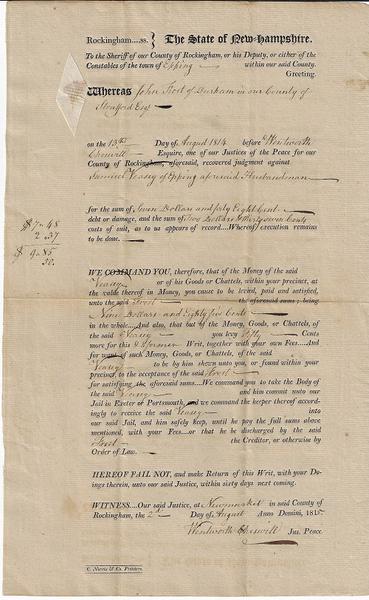Wentworth Cheswill - 1st African American Officeholder - Revolutionary War - Rode with Paul Revere

A one page document, partially printed, filled in and signed by Wentworth Cheswill as Justice of the Peace. Dated August 13, 1814, the document states that Cheswill “recovered judgment against Samuel Veasey of Epping….for the sum of seven dollars and eight cents debt or damage and the sum of two dollars and thirty seven cents costs of suit….” The document commands the sheriff or his deputy “cause to be levied, paid and satisfied unto...(John) Frost nine dollars and eighty five cents in the whole…..”
Wentworth Cheswill is considered, by George Mason University, to be the first African American, his father was black, his mother white, to be elected to public office in the United States. A very well educated man receiving his education at Governor Dummer Academy in Byfield, Massachusetts where he studied Latin, Greek, reading, writing and arithmetic as well as swimming and horsemanship, under the Harvard graduate William Moody. After receiving his education he returned to Newmarket and became a schoolmaster and by 1767 an established landowner of 30 acres plus a pew in the meetinghouse. His land holding increased to 114 acres by 1770. Between 1768 and 1817, the year of his death, Wentworth Cheswill held local public offices with the exception of 1788.
On Dec. 13, 1774, as the elected town messenger for the Committee of Safety, he rode with Paul Revere to warn Portsmouth citizens that two British warships were on their way to retake gunpowder and weapons stolen by the colonists from Fort William and Mary. When the American Revolution broke out, Wentworth Cheswell enlisted as a private in Col. John Langdon’s Company of Light Horse Volunteers and fought at the Battle of Saratoga which was the first major American victory of the American Revolution.
In April 1776, along with 162 of his fellow citizens he signed the Association Test which effectively placed him in opposition to the actions of the British. The Association Test stated “We the Subscribers, do hereby solemnly engage, and promise that we will, to the utmost of our Power, at the Risque of our Lives and Fortunes, with ARMS, oppose the Hostile Proceedings of the British Fleets, and Armies, against the United American COLONIES.” He left the military on October 31, 1777. In 1778 he was elected to the convention to draft New Hampshire’s first constitution, but was unable to attend. Sources: New England Historical Society; Wentworth Cheswell – Wikipedia.
Docketed L. Mitchell Esq. All executions. Frost vs. Veasey. Oct. 23d, 1815.
C. Norris & Co. Printers. Wafer seal intact, very minor toning, overall in vg cond.
